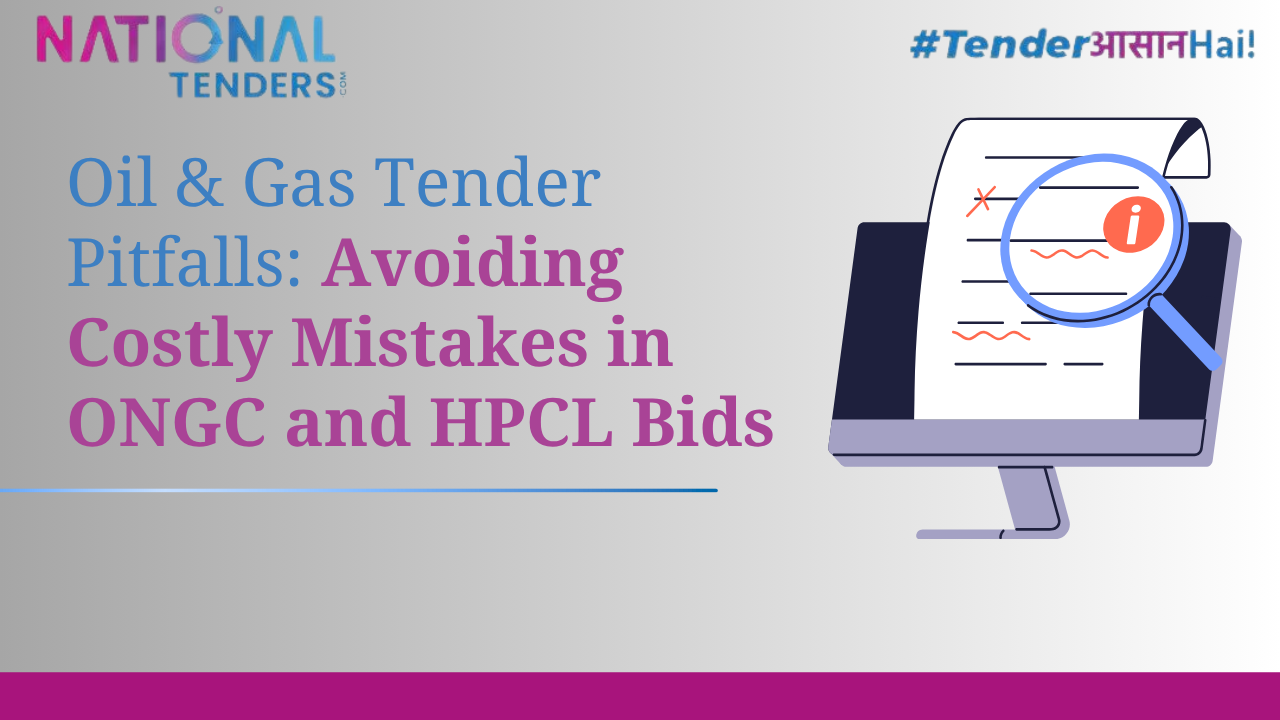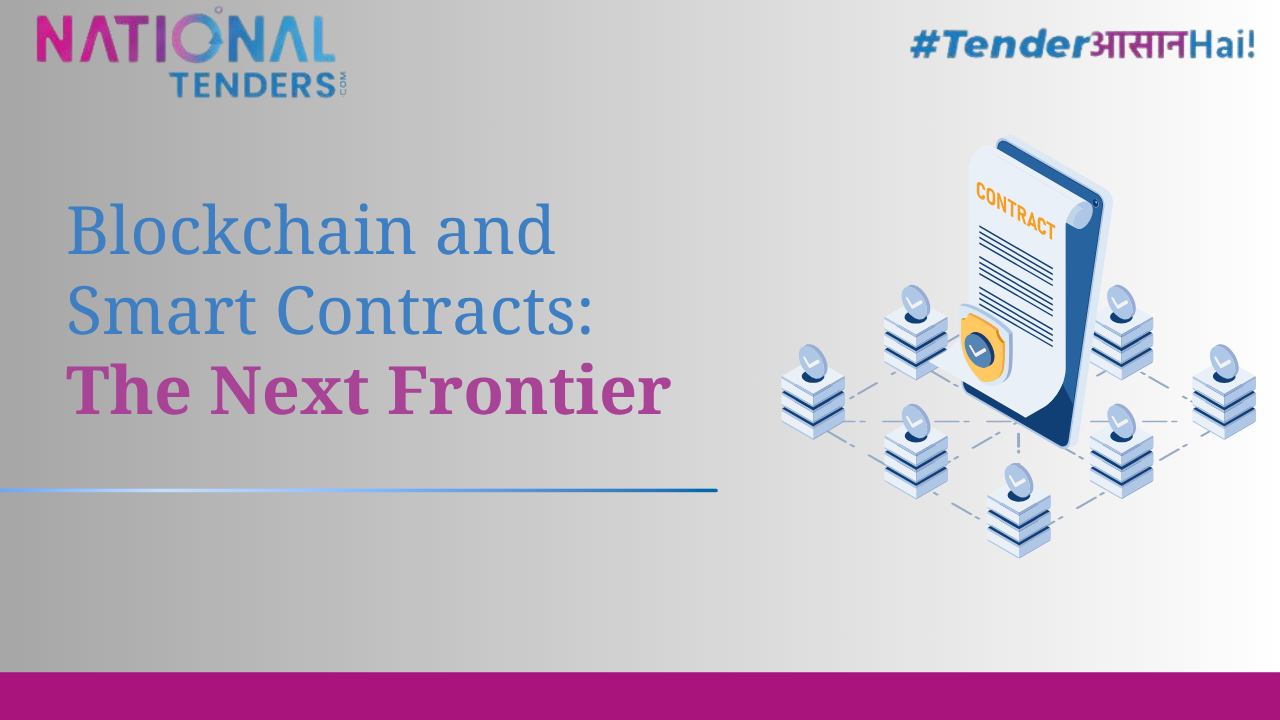- Home
- >
- Blog
OUR BLOG
A collection of stories about our people, our capabilities, our research, and the ever-changing face of our firm.

NationalTender
Oil & Gas Tender Pitfalls: Avoiding Costly Mistakes in ONGC and HPCL Bids | 30 May, 2025
Oil & Gas Tender Pitfalls: Avoiding Costly Mistakes in ONGC and HPCL Bids
Imagine spending weeks preparing your oil & gas tender for ONGC or HPCL, only to be rejected over a simple mistake. With over ₹20,000 crore worth of ONGC tenders floated annually and HPCL awarding contracts worth thousands of crores, the competition is fierce, and the margin for error is razor-thin. Every year, hundreds of bids are disqualified for reasons that are completely avoidable. If you want your next tender to stand out and succeed, this guide is for you.
The High Stakes of Oil & Gas Tenders
India’s oil & gas sector is one of the largest public procurement markets in the country. In February 2022 alone:
- ONGC floated 81 tenders with a cumulative value exceeding ₹20,000 crore.
- HPCL processed hundreds of bids worth over ₹50,000 crore.
With such massive opportunities, every detail matters. But what are the most common pitfalls that can derail your tender?
The Most Common Tender Mistakes (And How to Avoid Them)
-
Missing or Incorrect Documentation
A single missing document—like a PAN, GST, EMD, or experience certificate—can lead to outright rejection. ONGC and HPCL are strict about documentation, and incomplete submissions are the top reason for disqualification.
How to Avoid:- Prepare a checklist of all required documents.
- Double-check for notarizations, signatures, and validity dates.
- Upload documents in the specified format and section.
-
Technical Bid Errors
Submitting products or services that don’t comply with technical specs, or including pricing details in the technical bid, can result in rejection.
How to Avoid:- Read the technical specifications thoroughly.
- Never disclose price information in the technical bid section.
- Ensure your solution meets or exceeds every requirement.
-
Incorrect File Uploads and Portal Mistakes
Uploading the right files to the wrong sections—or using the wrong formats—can be fatal.
How to Avoid:- Use the recommended browser and validate your digital signature.
- Follow portal instructions and upload files early to avoid glitches.
-
Ignoring Corrigenda and Amendments
Tender conditions can change through corrigenda or amendments. Submitting outdated requirements can make your bid non-compliant.
How to Avoid:- Subscribe to tender updates and alerts.
- Review all addenda before submission.
- Adjust documents and pricing as per the latest instructions.
-
Improper EMD/Bid Security Submission
Invalid or missing EMD submissions lead to automatic rejection.
How to Avoid:- Check the EMD amount, acceptable formats, and validity.
- Attach all required supporting documents and receipts.
-
Underquoting or Unrealistic Pricing
Quoting below market rates to win the tender can result in losses or project penalties.
How to Avoid:- Conduct market research before quoting.
- Factor in all costs, risks, and contingencies.
- Prioritize sustainable pricing over aggressive underbidding.
-
Late Submission or Last-Minute Uploads
Late submissions due to technical issues or portal errors are never accepted.
How to Avoid:- Complete your bid well in advance of the deadline.
- Use a reliable internet connection and maintain backup copies.
Winning Oil & Gas Tenders: Best Practices
- Technical Compliance: Ensure your bid meets all technical and eligibility criteria.
- Attention to Detail: Review every document and figure to eliminate errors.
- Stay Updated: Monitor tender portals for new opportunities and corrigenda.
- Leverage Expert Support: Platforms like National Tenders provide bid preparation, tracking, and compliance checks to boost your success rate.
Why Choose National Tenders?
At National Tenders, we help you navigate the complexities of ONGC, HPCL, and other oil & gas tenders. Our services include:
- Comprehensive document preparation.
- Real-time tender alerts and updates.
- Bid submission support and compliance checks.
- Expert guidance to enhance your tender’s chances of success.
Conclusion: Your Path to Tendering Success
The oil & gas tender market is lucrative but unforgiving. With thousands of crores at stake and intense competition, even a minor slip can be costly. By avoiding common pitfalls and partnering with National Tenders, you can transform every bid into a winning opportunity.
Ready to bid smarter and win bigger? Contact National Tenders today for the latest oil & gas tender updates, expert support, and tailored solutions to maximize your success!
 How E-Tendering is Transforming the Tender System in India
How E-Tendering is Transforming the Tender System in India Building Strong Vendor Partnerships in the Tender Ecosystem
Building Strong Vendor Partnerships in the Tender Ecosystem Unlocking Big Savings Through Smart Tender Strategies
Unlocking Big Savings Through Smart Tender Strategies How Generative AI Is Disrupting Tendering in 2025
How Generative AI Is Disrupting Tendering in 2025 Blockchain and Smart Contracts: The Next Frontier in Public Procurement
Blockchain and Smart Contracts: The Next Frontier in Public Procurement
SUBSCRIBE NOW
Kindly fill up the form